29 September 2006
A Date with the Father of Modern Drama.
The best thing about the play is that Ibsen takes on everyone. The conservative town fathers are shown to be concerned about nothing more than their economic bottom line. The rabble-rousing newspape editor is revealed to be nothing more than a pandering turncoat, willing to sell out his causes based on the latest popularity poll. The printer Aslaksen comes in for brutal lampooning of his "moderate" approach to everything, and as representative of the middle-class, Aslaksen is devoid of opinions other than those given him by the mayor. Even Dr. Stockmann himself comes across as obsessed with the truth to such an extent you wonder if it's really the truth he's so passsionate about or whether it's a personal desire to be right about nearly everything.
In the end, Ibsen's message resonates heavily with Nietzsche's critique of democracy in that both lament the ability of the majority -- whom they characterize as largely self-satisfied dullards -- to rule over the minority. The ruling class, the bourgeoisie, and the radicals are all corrupt, smug, and self-serving and only a very few -- what Althusser labeled "Bad Subjects" -- break from the pack.
Ibsen's play does a tremendous job of showing these power relations and how they make a mockery of high-minded ideals like truth and justice. For Dr. Stockmann, it is simply impossible that anyone could possibly act in a way that isn't in accordance with truth, and he consequently insists that he has the right on his side and that will carry the day. However, while obviously not a Marxist, Ibsen lays bare the material relations of society such that the audience understands how capital exercises its sway over society: the liberal newspaper editor sacrifices his ideals (if indeed he ever had any) to keep his paper afloat; he in turn relies on the printer, who represents the property owners, whose property values and business prospects rest on the town baths, whose board of directors has no interest in losing their capital investment over something as silly as contaminated water that's actually poisoning their patrons.
Which reminds me of the Post's so-called coverage of the aftermath of the Guatemalan Civil War, but that's another post for another day....
27 September 2006
Internal rhythms
That of course was back before the day of teh internets, when you couldn't get any newspaper you wanted on-line and you actually had to be in the library to look at the catalog (it wasn't "online" back then -- it was "electronic"). So I've done some good work there, and the library has a gajillion books (actually roughly 5 million), which makes it a great place to find the last-minute resources. However, the real reason I go there instead of the much closer and more impressive Library of Congress is that up there I have babysitting (as in "Hey, Mom and Dad, wouldn't you love to see your grandkids this weekend?"). As my wife is feverishly working toward her own disseration deadline, it's not really possible for her to watch them, either. Note to self and others: you have a hell of a lot more disposable time when you don't have kids.
Anyway, I thought a little bit about how it was that in the last few weekends I've managed to write as many pages as I've written in the past year. One answer is simple: I've spent more time on it recently. However, I'd say another answer is that writing is a deeply personal and reclusive activity. No matter where you write, whether in a cafe, in a library, in a locked room, or out in a field, you don't really want to be disturbed: you want to be inside your head, forgetting as much as you can the world around you.
When I return to that library and sit in a hard-backed wooden chair with a stack of books in front of me, I can essentially forget where I am, much like a person listening to familiar music "forgets" what they're hearing -- it becomes part of the background (and it's for that reason that if I listen to music while writing, I can only listen to something I've already internalized).
The challenge sometimes is finding or creating that space where we forget ourselves.
25 September 2006
A large amount of light finally rushes in...
I love, by the way, the life of the academy.
The point is that between 1998 and 2004 I sort of went to sleep academically. Now it's late 2006 and I'm pretty much awake and not only that I can see the end, and damn it looks good. This week I turn in the final chapter and barring any major requests for changes, it's into the final stretch, which is putting it all together and writing a little introduction...sort of like putting the garnish on the plate.
Then I will refuse to respond to anyone who doesn't address me as "Doctor."
22 September 2006
Democrats are morons.
So they may not like the fact that the message came from a one-time coup leader and current elected -- yes, elected -- president of a foreign country, but there's no sense in looking like a bunch of idiots when even the members of his own party aren't exactly running out there to complain about it. Nancy Pelosi, so-called leader of the House Democrats, opined that Chavez was nothing but "an everyday thug." You'd wish she'd be that blunt in her criticism of Bush, who unlike Chavez did not win a large majority of the vote and whose policies have undoubtedly led to increased global tension.
Chavez may have a bit of a bone to pick here, since he overcame the US backed coup in his country in 2002. In my book, backing a coup against a foreign leader is a bit more greasy and underhanded than coming to the United Nations and insulting a foreign leader. In fact, I'd say that supporting a coup against a democratically elected leader is a better example of thuggish behavior than making a speech in the UN.
I long for the days of an oppositional party in the US.
20 September 2006
RIP: Joe Glazer
On the lines and at union rallies, particularly in the Bible Belt, he heard the tunes of traditional Christian hymns converted into labor anthems just by substituting a few lyrics. "We are climbing Jacob's ladder" became "We are building a strong union," for example. "Jesus is my captain, I shall not be moved" became "The union is behind us, we shall not be moved."
In his memoir, Mr. Glazer described leading the strikers around a giant Pepperell textile mill singing those songs. They were "basically one-line verses that could be quickly changed" to suit any situation, he said.
Glazer and other performers like him were part of a labor culture that is sadly lacking in the United States these days. In the early to mid-twentieth century, union halls were social spaces, with education programs and cultural events provided by and for the members.
Joe Glazer followed in the footsteps of Joe Hill and Ella May Wiggins (who was killed by vigilantes in the Gastonia Strike of 1929) and Woody Guthrie (whose later career overlapped Glazer's early career) and was a contemporary of Pete Seeger (who is amazingly still with us!).
In the words of Joe Hill, "Don't waste any time mourning. Organize!"
18 September 2006
Busy Weekend.
Day One.
Baltimore. It'd been probably three or four years since I'd last been in "Charm City," aka the city in which 1 in 10 citizens is a heroin addict, and while it's fun to rip on Balmer, it's really a funky and interesting place. Their train museum is incredible (I haven't been there since it caught fire, though), even if the only time I ever went on a little excursion there my three year old son and several other children were treated to a prostitute finishing up with a john on the side of the tracks...
Anyway, we went to the Baltimore Museum of Art, which by the way will be FREE for everyone beginning October 1. It'd been probably ten years since I'd been to BMA and I'd forgotten what a beautiful building it was. And how stunning the Cone Collection is. One feature that my son enjoyed very much was the 3D virtual tour of the Cone sisters' apartments where they kept their paintings and other artwork. Every wall spot that could hold a picture did hold a picture in their apartments -- even the bathroom walls (a beautiful Matisse hung over the tub...).
The BMA has activities for kids that they call "FunPacks," and one such activity is to get a few dress-up props that match a painting in the collection and then you find the painting and dress up as the painting. My son gave it a try:
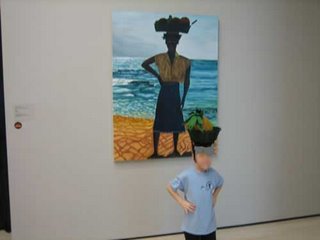
The blue apron was missing from his funpack because it needed to be resewn...
Day Two.
Ocean City. Since the weather forecast said it would be around 80 degrees on Sunday I decided to drag the kids off to Ocean City for a last chance to hit the sand and water. We went mini golfing, where I saw a very disturbing sight:
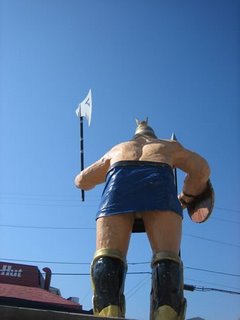
I can tell you that threw my entire game off.
Fortunately, we were able to hit the beach for the bulk of the day.
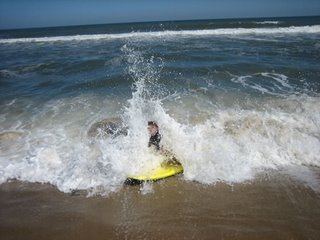
And still get home in time to rest for school on Monday.
15 September 2006
A few light thoughts for a Friday.
We are particulars. Have always been, but even more so now, ever more specialized,
limited to one segment of human experience.
You cannot watch it all. You cannot hear it all. You cannot read it all.
This feeling is nothing new.
Whitman understood this, Whitman who contained multitudes, who promised that if you stopped one day and night with him he would give you the origin of all poems.
What sublime seduction.
Emerson as well. "Man is not a farmer, or a professor, or an engineer, but he is all." Division upon division and we command only our small segments of experience while over under and across us wash unrelenting streams of information.
Jameson argues that in the postmodern era information approaches "total flow" and we no longer can process it before the next wave hits. According to his argument, it diminishes or destroys critical distance, making it ever more difficult to produce value judgements or sound analysis.
It happens. We register it. Next.
It is the format of television. It is the format of consumer society, where we are overwhelmed by choices. Choice in fact becomes us: are you a coke drinker or part of the Pepsi generation? Do you Do the Dew? You are more and more what you consume.
And so it goes.
14 September 2006
School's in session, but for some it's nearly over.
- they hate public schools and especially the local public school.
- they are neighbors and don't like -- and I quote -- "the sound of children screaming" on the playground.
To the first, I say, tough luck to you and your reactionary friends. Go start a chapter of the Objectivists Club or something, loser.
Other schools, however, are closing as early as next summer, which means many students and parents will be looking elsewhere as their neighborhood schools shut down. In many ways, I'm ambivalent about DCPS: I am a huge supporter of public education and I know that many schools even in this system are working well; however, DCPS and the School Board have been for years utterly disfunctional (case in point being the year several schools couldn't open on time because of fire code or other safety violations) and I can tell you as a parent activist in our school, you have to fight and fight again the bureaucracy of DCPS.
It's these years of ineptitude that set the stage for Congress declaring DC a great experimental zone (none of the Senators or Representatives wanted to make their own districts into laboratories) for vouchers and charter schools. Speaking of which, the head of that Mephistopholean organization, "Friends of Choice in Urban Schools," who had been salivating over the destruction of the traditional public school system, expressed disappointment over the pace of the superintendent's program:
Robert Cane, executive director of Friends of Choice in Urban Schools, a charter school advocacy organization, said he was "disappointed and upset" at the possibility of not getting the buildings in 2008. "If this is the case, the superintendent is not acting in a way to justify the faith the council put in him when they gave him the $2 billion for his program," Cane said.I've spoken to people from this office and if you've never met the devil before, you might want to talk to them, too. Like most of literature's Fausts, these imps speak in measured, reassuring tones and sound reasonable enough, until you hear the little undertones and catch-phrases that reveal them to be not so interested in children and quality schools as they are in dismantling government and teacher unions. That's when you realize that you're only a pawn in their game.
13 September 2006
Paging Dr. Strangelove...
Nonlethal weapons such as high-power microwave devices should be used on American citizens in crowd-control situations before being used on the battlefield, the Air Force secretary said Tuesday.
The object is basically public relations. Domestic use would make it easier to avoid questions from others about possible safety considerations, said Secretary Michael
Wynne.
"If we're not willing to use it here against our fellow citizens, then we should not be willing to use it in a wartime situation," said Wynne. "(Because) if I hit somebody with a nonlethal weapon and they claim that it injured them in a way that was not intended, I think that I would be vilified in the world press."
OK. So I wholeheartedly agree that we shouldn't be going out and injuring or possibly killing foreigners with untested weapons (or tested weapons for that matter, but that's just me), but I'm really trying to get my head around how it follows that we should therefore test them on US citizens.
Really, this sounds like something the Onion would print.
12 September 2006
My musical tastes are now novely acts.
Too bad they flamed out. I'm thinking about Jane's Addiction today because MSN.com had a photo of Dave Navarro up there and I thought, yeah it looked good on Johnny Depp in Pirates of the Carribean, but on you it just looks weird.

Of course, part of being a rock star is getting to do things that would have gotten you locked up or beaten up or left you jobless if you weren't.
Twenty years ago, being the host of a "reality show" would have been the equivalent of guest-starring on the Love Boat: your career was in tatters and the next stop was obscurity. It's the same now, except that some people mistake that tiny fizzle before the candle burns out for a rebirth of flame.
The lies aren't working? Lie some more. And wave the flag.
However, psychoanalytic critics out there would constantly remind us that no matter how much you suture over it with the Symbolic, the Real returns with a vengeance (I can see Zizek sweating like a pig and looking near collapse on a podium somewhere...). In other words, the myth of origins is exposed as myth.
Yesterday, on the anniversary of 9/11, George Bush again tried to link his Iraqi boondoggle with the al-Qaeda terror attacks. Here's briefly a bit of what the idiot king said:
"Whatever mistakes have been made in Iraq, the worst mistake would be to think that if we pulled out, the terrorists would leave us alone," Bush said from the Oval Office, with a photo of his twin daughters and the American flag behind him.
"They will not leave us alone. They will follow us. The safety of America depends on the outcome of the battle in the streets of Baghdad."
That's an interesting idea that actually turns upside down the actual course of events in history. You see, the terrorists actually attacked us in fall 2001; that's -- oh let me see -- about a year and a half before Bush turned the streets of Baghdad into a terrorist training ground. As I recall in 2001, Saddam was sitting around stewing in his own juices as UN sanctions (leaky though they may have been) inhibited his economic freedom and "no-fly zones" inhibited his military control.
Let me try to reiterate for the sake of the morons out there (read: the 35 to 40% who still believe in this false prophet who sits in the Oval Office):
- al-Qaeda was responsible for 9/11
- No 9/11 hijackers were Iraqi; most were Saudi
- 9/11 happened BEFORE the Iraq War
- Saddam Hussein's secular regime and al-Qaeda's religious-injected form of tyranny mix about as well as oil and water (or about as well as "Bush" and "sensible foreign policy")
(Oh and as an aside...speaking of Saddam Hussein, he made an interesting outburst at his trial yesterday, telling the Court that "You are agents of Iran and Zionism. We will crush your heads." Iran and Zionism. There's some oil and water for you. Add to that one part Kids in the Hall.)
11 September 2006
Lying and Lying Again Are Not Proper Responses to Terrorism.
It was an abominable, shameful act.
It's also an act that the Bush administration has yet to comprehend. These hijackers did not come out of nowhere and their complaints against the United States could not be summed up, as blithering idiot Bush tried to do, in the phrase, "they hate our freedom." Truth be told, I'm willing to bet just about everything I have that Osama and his gang of thugs couldn't give a rat's ass about "our freedom." In their twisted little minds they probably don't spend a whole lot of time thinking about whether we can order coke or pepsi, paper or plastic, which in America these days seems to be the predominant view of freedom: consumer choice. Neither do they really care if you can stand in front of the White House and scream about the President. What those murderers don't like about the United States is its role in the Middle East, or to expand a bit, what they consider "the Islamic World."
Reactionary, repressive bigots though they may be, it isn't another country's freedom per se that al-Qaeda hates; it's pretty much any non-Muslim, secular, or even non-crazy enough Muslim government that al-Qaeda hates. And even then, they mainly get pissed off over what they perceive as affronts to their own narrow interpretation of Islam. For example, they didn't have much time for Saddam Hussein's largely secular dictatorship. Nor did they care for Iran's shiite government. But the US really pissed them off because the US hits the trifecta: we have military bases in many Muslim countries, we support Israel, and we export a permissive culture (read: consumer culture) to the world.
Now you can argue about whether or not we could, should, or would change any of those things in light of al-Qaeda's opposition, but to refuse to understand that their motivations are more complicated and in fact different from "they hate our freedom" is to create the appearance that you are a moron and to subject yourself to further miscalculations and strategic mistakes.
Witness lead incompetent Dick Cheney. Yesterday on "Meet the Press," Cheney continued the old saw about links between al-Qaeda and Saddam Hussein, despite the fact that even last week the Senate Intelligence Committee reported that no links existed:
Cheney asserted that the slain al-Qaeda operative Abu Musab al-Zarqawi had fled Afghanistan and "set up operations in Baghdad in the spring of '02 and was there from then, basically, until basically the time we launched into Iraq." The Senate intelligence committee reported that, by October 2005, the CIA had debunked the idea of any prewar relationship between Zarqawi and Hussein's government.
Cheney told Russert that he had not read the Senate report.
Great. Here's the Vice President going on TV making claims that nearly every American in the demographic who watches that show knows to be false, and his response is that he "had not read the Senate report." We're supposed to trust this ignoramus who has grown so used to lying that he doesn't even worry about widespread public information contradicting his lies?
What's that gurgling sound? Oh yeah, it's whatever small amount of credibility the US still had in the world trickling down the drain.
Lying is no way to honor the dead or avenge their loss.
10 September 2006
This Weekend, Good and Bad
That of course brings me to the good news: I managed to write something like ten pages this weekend. What's more amazing is that the weekend isn't over yet and if I weren't breaking for lunch, I'd be writing now. I can almost smell the end, just like I could smell the nasty breath of that fatass Charlie Weis through the television yesterday. Really, is it possible to wear an outfit less flattering than what Weis consistently wears? Jesus, wear some pants that don't make you look like you're hiding an overloaded Depends beneath your belt.
09 September 2006
Lessons learned from a poor first half
1. Two dropped interceptions=two Notre Dame field goals
2. Trying to pick up a fumble rather than diving on it=another
missedopportunity for a turnover
3. No pressure on the quarterback=two more Notre Dame scores
4. Playing Notre Dame in South Bend=phantom clipping calls and very kind
ND spots.
5. Watching Penn State self-destruct (another botched fieldgoal snap,
fumble at mid-field, aforementioned failure to finish turnover
opportunities)=severe stomach turbulence.
20 to 0 at the half is the actual score. It should really be no more
than 14 - 0...damn those dropped interceptions.
06 September 2006
Didn't Hegel say something about history repeating?
TB permeates Eugene O’Neill’s masterpiece, Long Day’s Journey Into Night, and O'Neill himself spent time in a sanatorium to recover from the disease.
Kay Boyle's Year Before Last tracks two young artists (Boyle and her TB-stricken lover and avant-garde literary magazine editor Ernest Walsh) through Europe as Walsh deteriorates and finally dies of tuberculosis.
John Keats died of the disease in 1821 at age 25; his brother Tim had died of TB only a few years earlier in 1818.
Perhaps hardest hit were the Bronte family, that prolific group that gave us Jane Eyre (Charlotte), The Tenant of Wildfell Hall (Anne), and Wuthering Heights (Emily). Brother Branwell was mainly a painter and sometime poet who seemed to spend a good bit of time getting dismissed from tutoring and clerking jobs. Every one of them -- as well as two of their siblings who never made it to adulthood -- died of TB (some critics suggest Charlotte did not, but that's a nuance we'll let others sort out).
05 September 2006
02 September 2006
Happy Valley Deluge.
It has been raining up here for a steady 24 hours and it's a cold
bone-chilling rain. Scalpers are trying to unload their tickets for $25
or less. The various Penn State clothing stores downtown have sold out
of all raingear and many students are walking around in garbage bags
with holes poked through for their heads and arms.
My son's enthusiasm to be at the game has dampened somewhat.
However, we're still outside the stadium waiting for a friend before
heading in. It should be interesting to see what the teams do in these
conditions. It should also be interesting to see how long my son lasts
in the rain before we have to leave.
01 September 2006
We Are...Penn State!
Incidentally, the remnants of Ernesto are due to arrive in Happy Valley sometime around 3 p.m. that day. So it should be an interesting game as my son and I have tickets and will be attending the game to watch 250 year old Joe Paterno (OK so he'll actually only be 80 later this year, and he's only been head coach at PSU since 1966) lead the Lions onto the field.
Joe Paterno's consistent style has made him an icon in Happy Valley. Let's compare some shots photos of JoePa through the years:
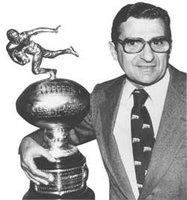
Accepting the Lambert Trophy for best team in the East, after his 1969 team went undefeated (as did the 1968 team). Penn State was not named national champion either year.

With great Ohio State coach Woody Hayes, before Woody went nuts and started punching players.
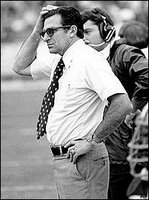
I'm not sure of the vintage of this photo. I think it might be late 60's or early 70's.
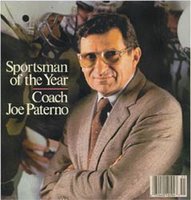
1986. Sports Illustrated's Sportsman of the Year.
[And Blogger Photos crap out on me now...Thanks]
